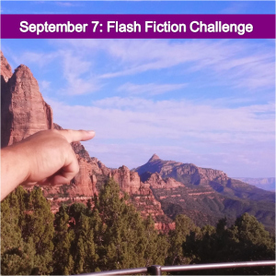| I had a dream last night. Don’t worry, I’m not going to bore you with the details, as I can’t remember much more than the basics of the characters involved: a mother, father and three young boys. It was one of those dreams that feels extremely vivid, but doesn’t translate into the waking world. And, while I don’t think the dream content merits interpretation, I do take it as a communication from my unconscious mind. A reminder of its existence, or my belief in such, in good time to provide a theme for the post I wanted to write today in response to the latest flash fiction challenge. |
Whether we encounter it in dreams, or in the state of reverie induced by the rhythms of walking, the unconscious is a gift to the writer of creative fiction or non-fiction. One of the greatest pleasures of the writing life is being surprised, shocked or amazed by the behaviour of the people one has made up.
I was deep in the story, carried along by its momentum. If I ran into difficulties with a scene, a solution generally presented itself overnight. I think Stephen King calls this 'leaving things to the boys in the basement'.
I was constantly startled by Frances’s behaviour. I was working to an outline, I knew where the story was going at every point, but the little details […] took me by surprise. It was a sequence of small and rather delicious shocks. Harriet Lane
Writing my debut novel, Sugar and Snails, I still vividly remember the moment I “discovered” the guilty secret of my main character’s father, Leonard, as a young prisoner of war that had shaped his parenting choices. I’ve also written elsewhere about the “shock revelation” I had about my own painful adolescence that freed me up sufficiently to begin writing that particular novel.
In these two examples, the communication was too strong to ignore, but the messages from our unconscious minds are often much more subtle. If we want to draw on our unconscious minds, it’s worth making space for the unexpected.
I think we often write as we live – prompted by the unconscious. [… W]hen you step away from a creative problem, the unconscious works to solve it. That’s why writers need to protect their non-writing time, and why sometimes ideas seem to come out of nowhere. Shelley Harris
Some swear by writing exercises, such as morning pages; some, like me, find inspiration through walking; some even through housework. But, while stream of consciousness works for some, we need the discipline of our conscious minds to translate this into something others will want to read. That’s partly why I’m a little suspicious of dreams in fiction, although I did use one as a plot device in Sugar and Snails. (I envisaged it as a strong hint of Diana’s secret but, as far as I’m aware, most readers didn’t guess till later.) That might be why I enjoy slipstream as a genre that seems to sit between the conscious and the unconscious.
Given my general aversion to the supernatural, I do sympathise with those rationalists who reject the whole notion of the unconscious – although I that doesn’t stop me thinking they’re wrong. As I’ve inferred in a couple of my non-fiction reviews (The Social Brain; The Voices Within), I lament British psychology’s distancing from psychoanalytic ideas, despite their potential contribution to the interpretation of the results of controlled experiments. While I gave my character, Diana, some aspects of my character and biography, I enjoyed making her a very different kind of psychologist to me, someone with little interest in wishy-washy psychotherapy. Steve, the protagonist of my forthcoming novel, Underneath, is similarly dismissive of any attempt on the part of his girlfriend to look for deeper meanings beneath his undeniable distress.
The amazing capacity of the unconscious mind features in some of my short fiction, particularly in these stories in which temporary delusions protect the characters from uncomfortable truths: ”Melanie's Last Tune”; “Madonna and Child” (p12); and in my latest short fiction publication, ”Dancing White” (p29). The latter emerged from a flash-fiction challenge on the subject of water from a couple of years ago. If you’re interested, you can compare the version published by Crack the Spine with the original 99-word flash. I think this is my first publication from one of Charli’s flash fiction prompts, although perhaps untypical given that both the mini version and the extension came from the same uncomfortable experience in which memory merged with fiction and also generated another short story, “Silver Bangles”, published over three years before.
So finally to a fresh 99-word story on the theme of amazing:
Speed dial
| Phone clamped to my ear, I throw clean underwear into a bag. I hate to miss her birthday, but Gill will understand. Grabbing my toothbrush, I blurt out what I know. The idiot’s done it again. I’ve got to go. There’s no-one else. Silence at the other end. Why doesn’t she speak? “The idiot?” A man’s voice? Offended. How could I call him instead of Gill? “Sorry!” I cringe to think I’ve hurt him. “I didn’t mean it.” But I did. “We need to talk about this.” Time he got some proper help. Stopped relying on me. |























 RSS Feed
RSS Feed





















